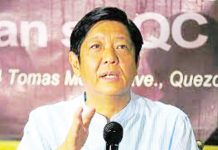
MARIJUANA is a mixture of dried flowers of cannabis sativa. It is as natural as tobacco leaves.
Yet marijuana continues to be classified as an illegal substance, mere possession of which is penalized in the Philippines under the Comprehensive Dangerous Drugs Act of 2002.
***
Is marijuana seized in an airport facility without a search warrant admissible in evidence against the accused?
***
This may seem like an easy question for a law student to answer.
The truth, however, is that several conditions exist in any given case that Supreme Court justices themselves can sometimes fail to come to an agreement on how to resolve questions that are anchored on the people’s right against unreasonable searches and seizures.
An airport, for instance, is among the most tightly guarded facilities anywhere in the world because of a hundred or more crimes that can possibly be committed in airline travel.
Smuggling, drug trafficking, terrorism, etc., are examples of these illegal activities.
***
Administrative searches normally do not require search warrants signed by a judge. These are allowed in situations where securing a warrant would be foolhardy or impractical.
An airport environment has such special conditions.
Thousands of travelers go through our airports daily. This has necessitated the procurement of x-ray machines, body scanners, and other devices. People have exchanged a certain degree of their privacy for public safety.
The potential of a bomb explosion in an airport or airplane makes meeting constitutional standards on searches unreasonable or next to impossible.
***
Manning our airports are personnel of the Office of Transportation Security (OTS) under the Department of Transportation.
The OTS mandate is to safeguard civil aviation against hijacking, hostage-taking, physical injuries, and similar acts of violence.
The war against illegal drugs is not included in that mandate.
In a recent case, the Supreme Court said that while routine airport security searches are allowed, the OTS mission is to look for explosive, flammable, corrosive or poisonous substances that may be used to commit hijacking or acts of terrorism.
***
Given that context, can the OTS submit in evidence rolled sticks of dried marijuana leaves contained in a cigarette pack supposedly discovered on a passenger after a tip was given to OTS agents?
The Supreme Court said no.
Airport search is reasonable when limited in scope to the Anti-Hijacking program, not the war on illegal drugs. The drug is admissible only if found “by chance” in a routine security search.
According to the Court, a search on the person of the passenger or on his personal belongings in a “deliberate and conscious effort” to discover an illegal drug is not authorized under the exception to the warrant and probable cause requirement.
***
Examples of valid discoveries of illegal drugs in airports are:
Activation of a metal detector prompted police officers to inspect the body of the accused and the package he was carrying. It turned out that the package contained marijuana.
The accused passed through a metal detector and triggered a beeping sound. Shabu was found on her body when she was frisked.
During a routine frisking, the guard on duty noticed an unusual thickness around the buttocks area of the accused. A more stringent body search revealed sachets of shabu.
During another routine frisking, the frisker felt something hard on the abdominal area of the accused. This aroused suspicion, especially when the passenger said that she was only wearing two panty girdles. Further search yielded shabu plastered on her abdomen./PN





